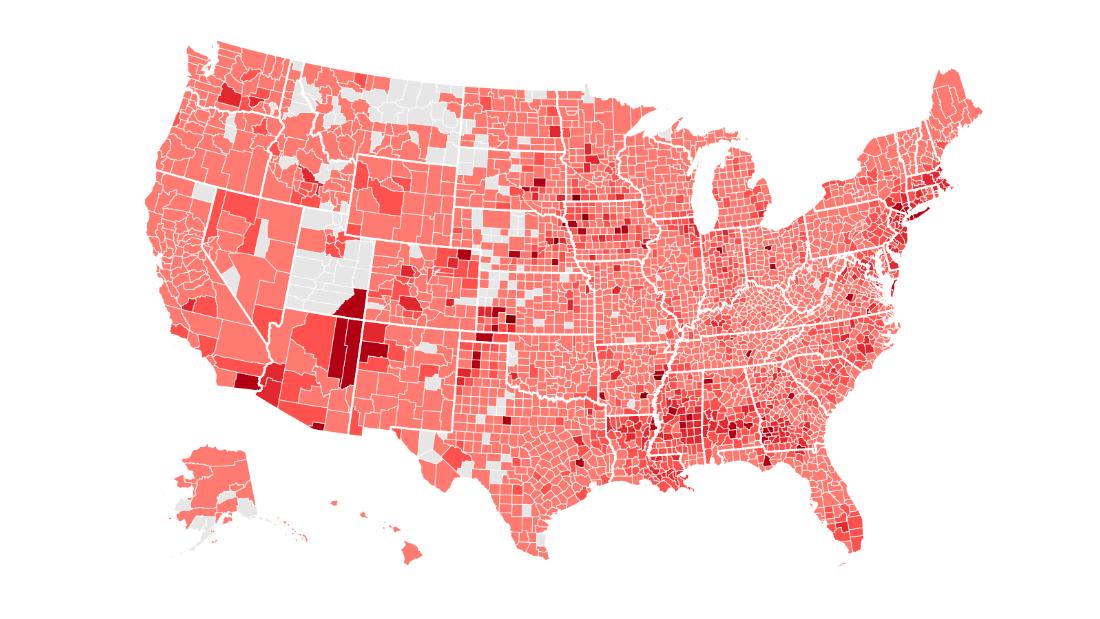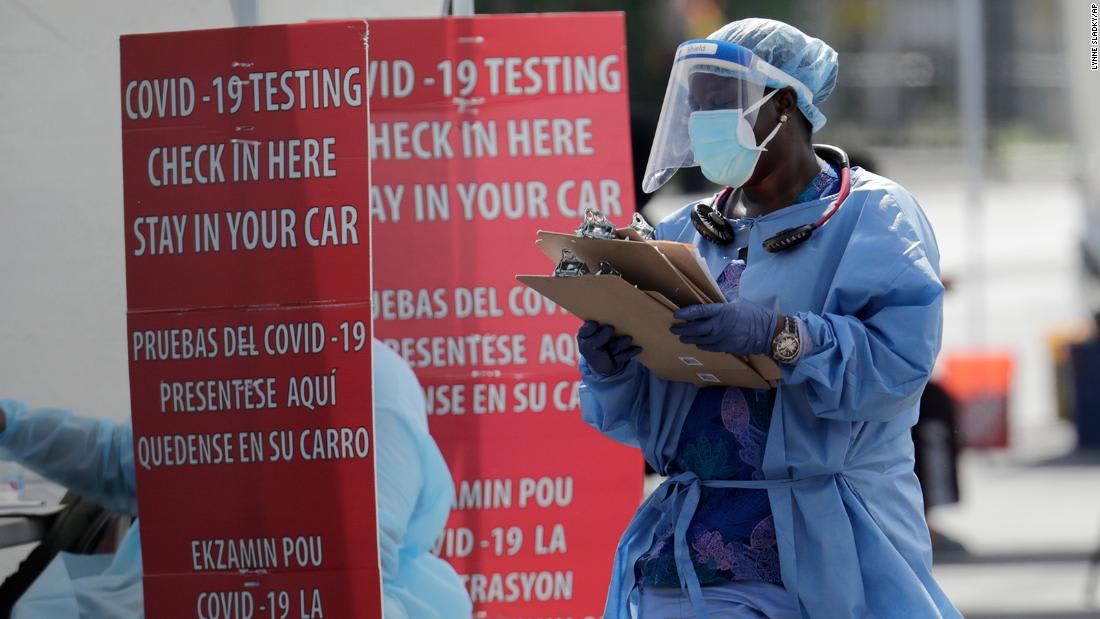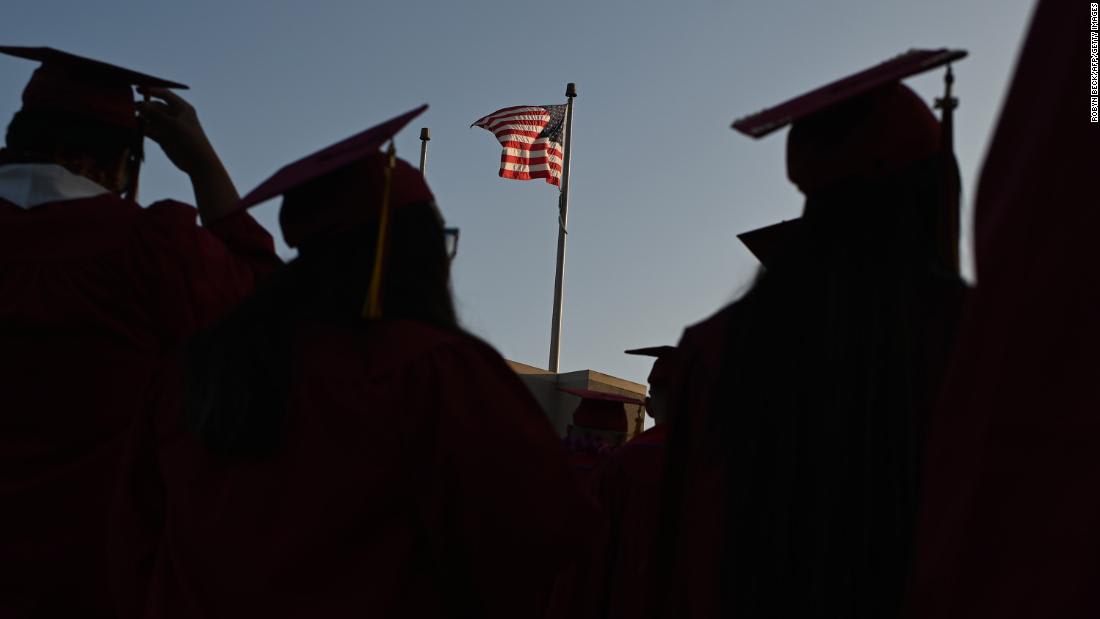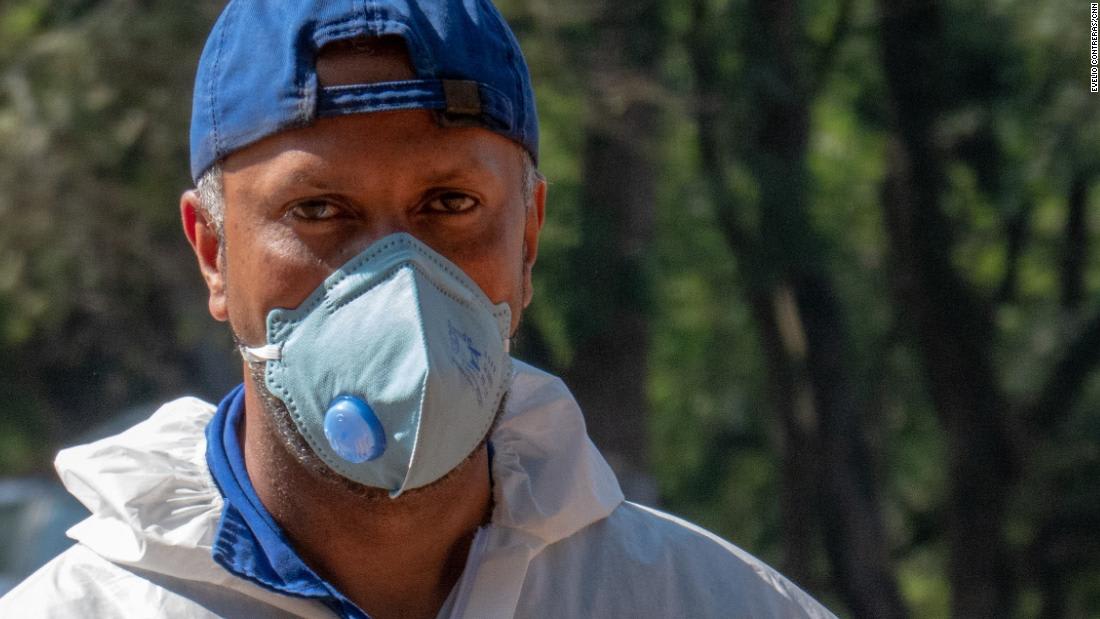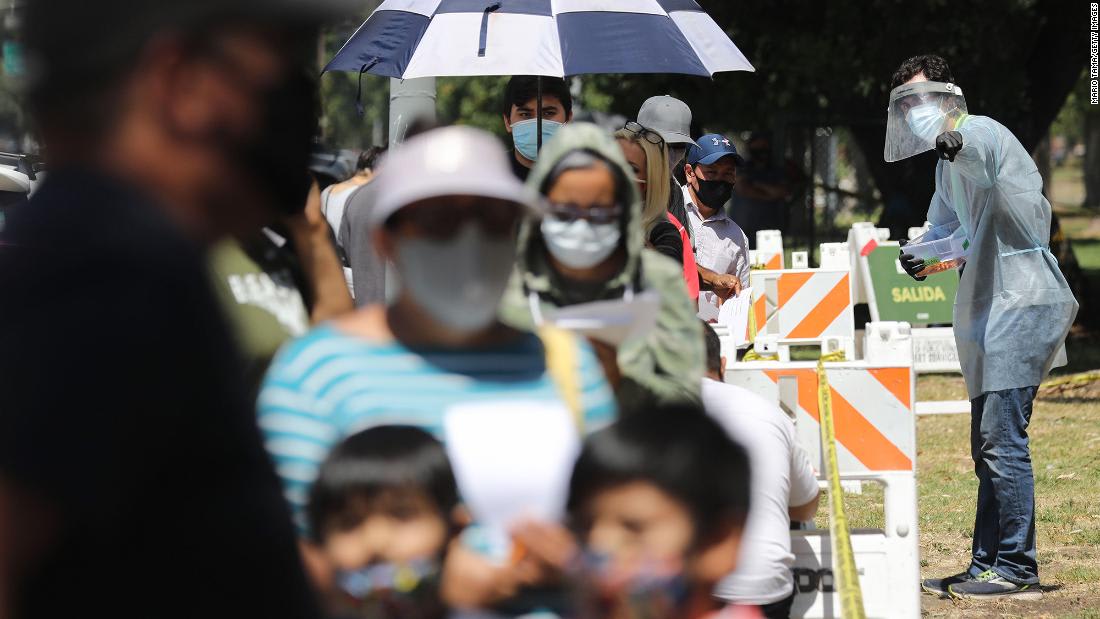US reports more than 60,000 cases on Tuesday -- its highest single day count
From CNN's Joe Sutton
The United States reported 60,021 new coronavirus cases and 1,195 deaths on Tuesday, according to Johns Hopkins University.
It's the highest number of cases reported in a single day in the US since the pandemic began.
The US is close to 3 million infections. In total, there are 2,996,098 reported coronavirus cases in the country and 131,480 people have died.
The totals include cases from all 50 states, the District of Columbia and other U.S. territories, as well as repatriated cases.
CNN’s map is tracking the US cases:
Coronavirus positivity rate: What the term means
From CNN's Theresa Waldrop
From social distancing and self-quarantine to a new take on sheltering in place, our coronavirus vocabulary expands almost daily.
Lately, a lot of health and elected officials have been using one term an awful lot: positivity rate.
What it means: That's the percentage of people who test positive for the virus of those overall who have been tested. So, as more and more people are being tested, the focus is shifting to the positivity rate -- how many of those tested are actually infected.
Here's an example: Miami-Dade County in Florida, where the number of cases is skyrocketing, on Sunday reported a 26% positivity rate. So, for every 100 people tested, 26% of them tested positive for coronavirus.
A lot of officials point to a rising positivity rate to counter arguments that the increase in case numbers is simply the result of more people being tested.
Read the full story:
One million foreign students risk being frozen out of US colleges. Some might never come back
From CNN's Julia Hollingsworth
In two months, 19-year-old Tianyu Fang is due to start his first semester at one of the most-prestigious schools in America: Stanford University in California. Now, the Chinese national isn't sure if he'll make it.
Fang is one of the million or so international students who could be made to leave the United States if their universities switch to online-only learning, under a rule announced by Washington on Monday. Those who don't leave voluntarily face deportation.
Some universities have announced they will deliver all courses online due to the coronavirus pandemic. Others are still planning to run classes on campus, but with the US outbreak still not under control, there's a risk that those institutions could go remote, too.
More than half of international students in the US come from Asia. In the 2018-2019 academic year, 370,000 students were from China, 202,000 from India, and 52,000 from South Korea.
Travel restrictions: The pandemic is already complicating efforts to return to the US for studies. There are few flights between the US and China, where international arrivals have to quarantine for two weeks. For those already in the US, it may be harder for some students to get home than others.
The decision could impact the US economy: In 2018, students from China, India and South Korea alone contributed more than $25 billionto the economy, according to non-profit Institute of International Education. If students are forced to leave the country, they may not be willing to continue paying tuition fees to study remotely from a different time zone.
Missed opportunities: If international students are sent home early, it's not just their education that will be impacted. Students could end up missing out on job opportunities -- often one of the reasons they might have chosen to study in the US in the first place.
Read the full story:
Beijing continues to report zero new coronavirus cases since wholesale food market outbreak
From journalist Vanesse Chan in Hong Kong
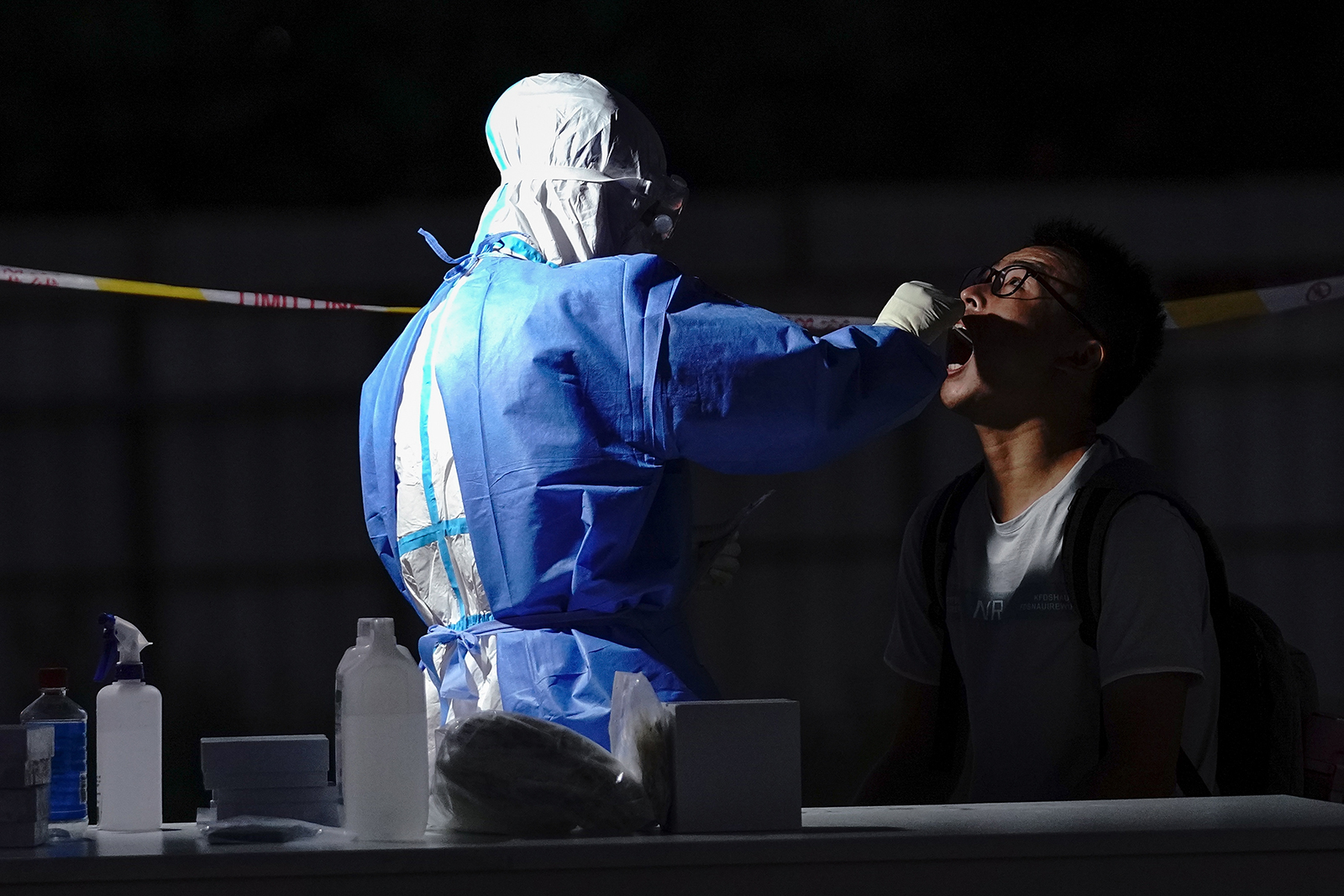 A medical worker wearing a protective suit takes a swab at a temporary test station on July 6, in Beijing. Lintao Zhang/Getty Images
A medical worker wearing a protective suit takes a swab at a temporary test station on July 6, in Beijing. Lintao Zhang/Getty ImagesBeijing reported zero new coronavirus cases on Tuesday -- marking the second consecutive day without any new infections in the Chinese capital since the Xinfadi wholesale food market cluster was discovered on June 11, China’s National Health Commission (NHC) said today.
Meanwhile, China continued to report a single-digit rise in new Covid-19 cases in the mainland as seven new imported cases were registered on Tuesday, which is one less than the day before.
Out of the new cases, four were reported in Inner Mongolia, and one each in Shanxi, Guangdong and Yunnan, the NHC said.
There were no new coronavirus-related deaths recorded in the past day.
Six asymptomatic cases were reported on Tuesday, the health authority said, adding that 117 asymptomatic patients are still under medical observation.
Police fire tear gas at protesters in Serbian capital
From CNN’s Milena Veselinovic
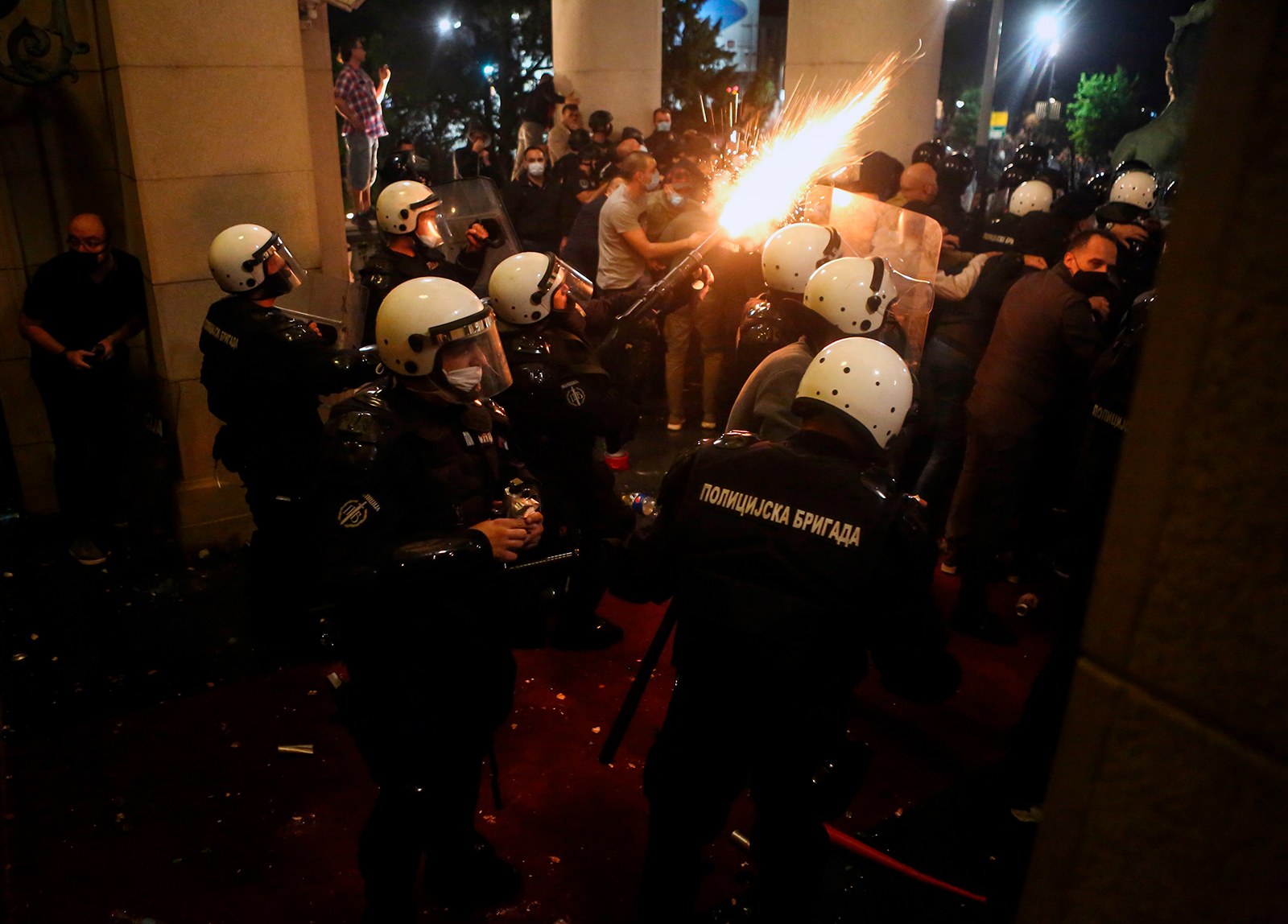 Protesters scuffle with police in front of the National Assembly building in Belgrade, on July 7, as Serbian police fired tear gas to disperse thousands of protesters angry at the return of a weekend coronavirus curfew. Oliver Bunic/AFP/Getty Images
Protesters scuffle with police in front of the National Assembly building in Belgrade, on July 7, as Serbian police fired tear gas to disperse thousands of protesters angry at the return of a weekend coronavirus curfew. Oliver Bunic/AFP/Getty ImagesPolice in the Serbian capital Belgrade fired tear gas at protesters demonstrating against the country's President Aleksandar Vucic after he announced a weekend-long curfew to try to combat a surge in coronavirus cases.
Video from the scene showed at least several hundred demonstrators gathered around Serbia's Parliament where scuffles erupted, prompting riot police to fire thick plumes of tear gas.
Some protesters also threw objects at the police, video showed.
On Tuesday, Serbia recorded its highest daily death toll from Covid-19 since the start of the pandemic, with the country's President calling the situation in Belgrade “alarming."
But protesters told CNN affiliate N1 they were angry because the government allowed the virus to spike out of control by lifting most restrictions in early May, meaning bars and nightclubs were able to operate at full capacity.
The protesters also said the government lifted restrictions in order to hold a general election in June -- the first Europe country to do so during the pandemic. Campaign rallies – with little or no social distancing – were held.
As they surrounded the Parliament building in central Belgrade, protesters chanted "arrest Vucic" and "treason." A small group of protesters managed to enter the Parliament's lobby before they were pushed out by the police.
The Balkan nation initially implemented one of Europe's strictest lockdowns to tackle the Covid-19 outbreak, with nightly and weekend-long curfews across the country and over 65s banned from leaving their homes.
Gravedigger takes Covid-19 more seriously than Brazil's President
From CNN's Bill Weir in São Paulo
Adenilson Costa has worked at the Vila Formosa graveyard for a quarter of a century and he says he has never seen the fresh graves fill up so fast.
It's the largest cemetery in Latin America, but since coronavirus came to Brazil, it isn't big enough.
Families are hustled through funerals, Costa said, each given no more than 10 or 15 minutes to say goodbye so the cemetery can manage up to 80 burials a day at this site on the outskirts of Sao Paulo.
"That makes us very shocked, very sad, because it is the last greeting they will give to the loved one that they lost and they do not have time," Costa said.
He spoke on a momentous day for Brazil -- a day when the Health Ministry announced more than 45,000 new cases of Covid-19 in the country, one of them the President, Jair Bolsonaro.
Bolsonaro has spent months downplaying the spread of the lethal virus, even as Brazil became the country with the second-most cases -- and deaths -- behind only the United States.
And while gravedigger Costa is shocked by the rate of death, Bolsonaro told many of his citizens they had nothing to worry about, as he announced he himself had the virus.
Read the full story:
"Emerging evidence" of airborne transmission of coronavirus, WHO says
From CNN’s Shelby Lin Erdman
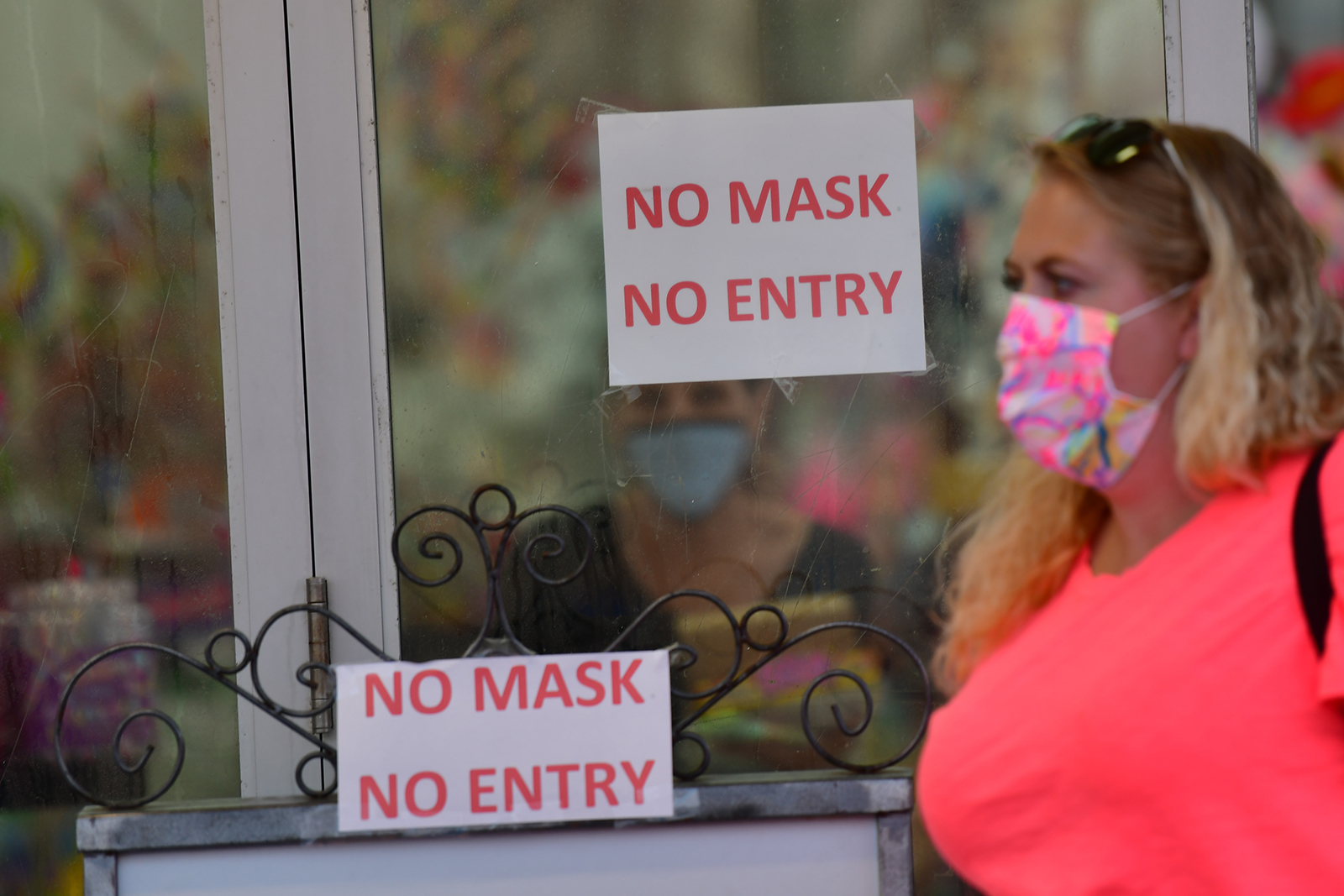 A woman wearing a face mask walks past a Boardwalk store with signs warning patrons of mask requirements on July 3, in Wildwood, New Jersey. Mark Makela/Getty Images
A woman wearing a face mask walks past a Boardwalk store with signs warning patrons of mask requirements on July 3, in Wildwood, New Jersey. Mark Makela/Getty ImagesThe World Health Organization confirmed there is “emerging evidence” of airborne transmission of the coronavirus.
It comes after 239 scientists published a letter urging the agency to be more forthcoming about the likelihood that people can catch the virus from droplets floating in the air.
Infectious disease epidemiologist Maria Van Kerkove, with WHO’s Health Emergencies Program, said many of the letter’s signatories are engineers, “which adds to growing knowledge about the importance of ventilation."
She said the WHO is working on a scientific brief summarizing the current knowledge around transmission of the coronavirus, which should be available in the coming weeks.
Alleganzi cautioned that more research is still needed on Covid-19 transmission.
“These are fields of research that are really growing and for which there is some evidence emerging but is not definitive,” she said.
Trump leans into old failures in push to reopen schools as virus roars
Analysis from CNN's Stephen Collinson
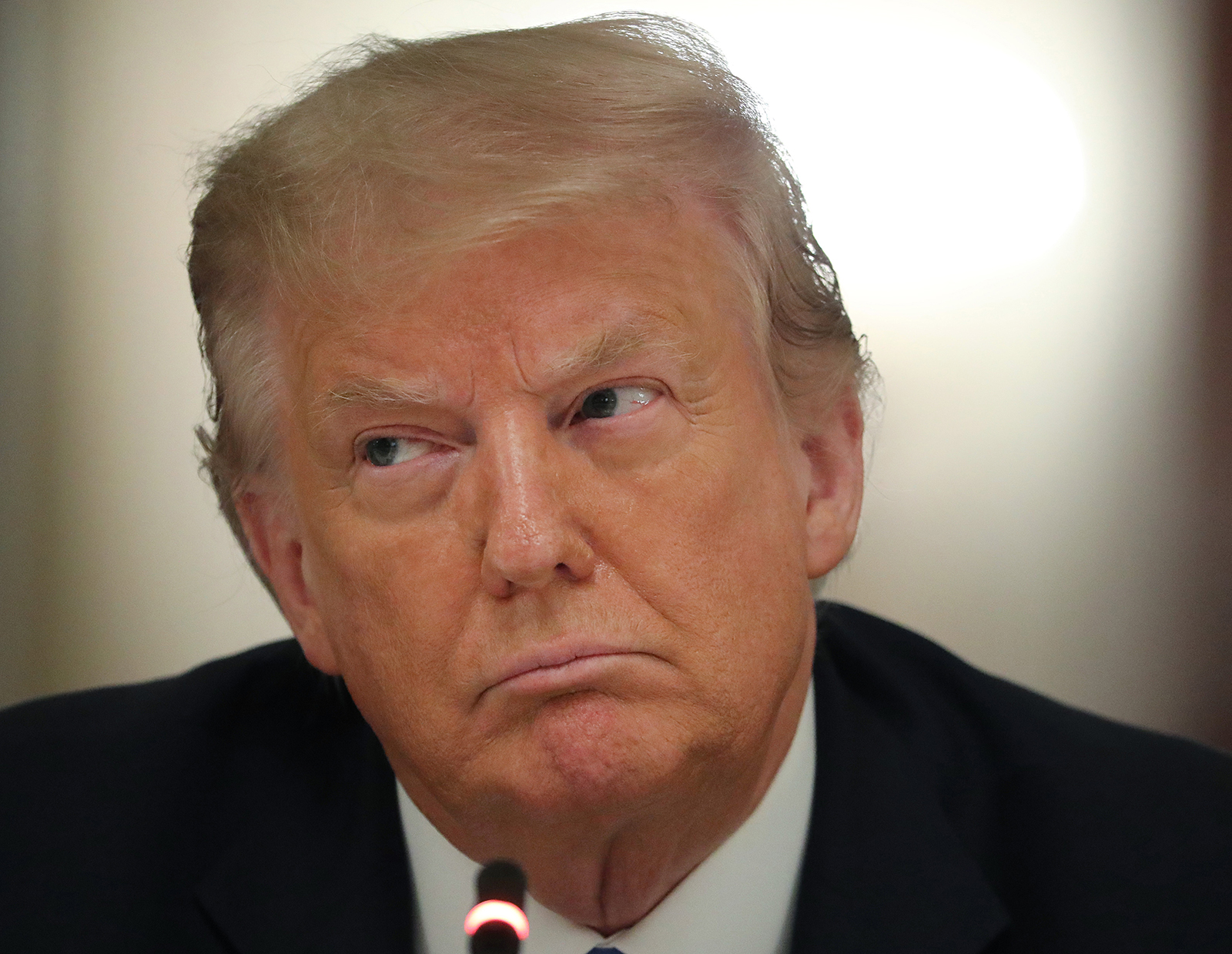 US President Donald Trump participates in an event in the East Room at the White House on July 7 in Washington, DC. Chip Somodevilla/Getty Images
US President Donald Trump participates in an event in the East Room at the White House on July 7 in Washington, DC. Chip Somodevilla/Getty ImagesPresident Donald Trump's new push to open schools shows he's learned nothing from calamities sparked by his demands for premature state openings.
The coronavirus pandemic is again rearing out of control, rising in a majority of states as a new warning comes that more than 200,000 Americans could be dead by Election Day.
But Trump barreled forward anyway, failing to offer detailed proposals for how schools could open safely next month even as he admitted he planned to crank up pressure on governors to do what he wants.
He also delivered a fresh rebuke to his government's top infectious disease specialist, Dr. Anthony Fauci, who had dismissed the President's discredited claims that the US has the world's lowest mortality rate.
And Trump conjured another wishful prediction: that the worsening battle against the virus, which has already killed 130,000 Americans and infected 3 million, would be far less serious within weeks.
Schools: Trump's self-serving implication that his opponents want to keep schools closed to hurt him politically ignores the complicated concerns that administrators, teachers and parents harbor over the prospect of schools staying closed -- and the dangers that are inherent in getting classes up and running again.
Economy: The US economy is now threatened by a second slump if the virus gets so bad that states and cities are forced back into lockdown. Trump's administration falls short on all those key strategies and even now is ignoring best practices and the evidence of what worked elsewhere in a bid to crank up the economy, deemed vital to the President's reelection hopes.
The US is about to reach 3 million coronavirus cases. Here's what happened in the days leading up to it
From CNN's Nicole Chavez
The coronavirus pandemic is ravaging parts of the US and affecting numerous aspects of American life. The number of confirmed coronavirus cases is nearing 3 million.
While the future of the pandemic in the US is still unclear, here's what has happened in the last few days.
Trump addressed crowds at Mount Rushmore: During his remarks, the US President mentioned the virus once, at the very top of his remarks, thanking those working to fight it.
Beaches were packed for the Fourth of July: Some Americans altered their traditional Fourth of July celebrations while others flocked to beaches to enjoy the holiday weekend.
People have waited several hours to get tested: Covid-19 testing capacity has increased considerably since March but the recent surge of cases is causing long lines to get tested and slow results.
Some hospitals reached capacity: Dozens of intensive care units at Florida hospitals near Miami, Orlando and Tampa have hit capacity and there are concerns that more hospitals could be next.
A debate over school reopenings has emerged: Florida schools have been ordered to reopen in August but teachers in some of the state's largest school districts are pushing back.
MLS is coming back despite coronavirus concerns: Major League Soccer's MLS is Back Tournament kicks off on Wednesday after more than a dozen people, including FC Dallas and Nashville SC players have tested positive for the virus.
Read the full story:

 5 years ago
653
5 years ago
653 